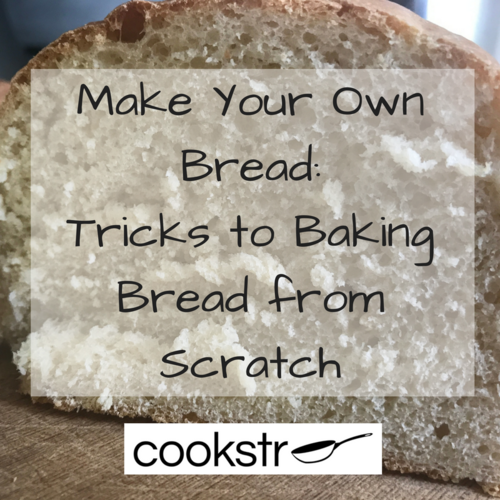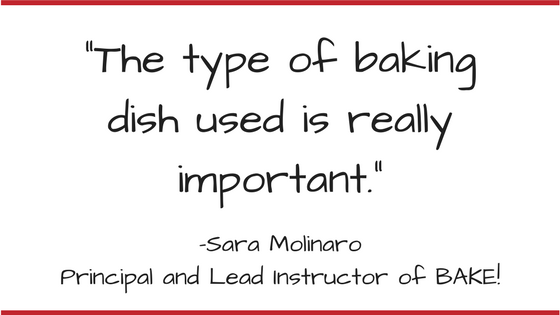Make Your Own Bread: 6 Tricks to Baking Bread from Scratch
Bread baking for beginners doesn't have to be intimidating with these tips in mind!

Novice and experienced bakers alike enjoy the thrill and challenge that comes when you make your own bread from scratch. Alternating between periods of intensity and long durations of waiting, bread-making is not for those who are impatient and expect to see immediate results. Whether you already know how to bake loaves of your own bread or are just getting into this type of baking, keeping a few of the tricks and hacks to bread-making by your side can make all the difference.
In Make Your Own Bread: 6 Tricks to Baking Bread from Scratch, you'll learn some of the best ways to improve your bread-making skills. Roll up your sleeves and get ready to bake!
Don’t Kill the Yeast When Baking Bread
You’re ready to roll up your sleeves and get to work, with visions of fresh-baked homemade bread dancing in your head. Before you start mixing and kneading, you need to get to the basics of using the right temperature for the liquid used in your bread. If the liquid, such as milk or water, is too hot, then the yeast will be killed; if it’s too cold, then the yeast won’t activate. What’s the right temperature? The website of BBC GoodFood recommends a temperature of about 100 degrees F. If you have a kitchen thermometer, then use it to ensure you have reached an accurate temperature.
Knead the Bread: Are You Doing It Correctly?
Knowing how much to knead a loaf of bread can be a difficult task. If the dough is under kneaded, it could be dense and, while still edible, won't look quite like right. If the dough is over kneaded, America's Test Kitchen points out the loaf may have "expired" flavor. As your end game is to produce a loaf of bread that is fresh, this is precisely what you do not want. The organization also notes that dough is kneaded thoroughly when it can clear the side of the bowl. In other words, it should be easy to remove the dough from the bowl or surface on which the dough has been kneaded.

Let Your Dough Chill Overnight
When you start the bread-baking process, you likely want to push through until you are rewarded with a fresh-baked loaf of bread. However, Tom Edwards, owner of restaurant and artisan bread school MozzaPi in Louisville, Kentucky, suggested placing your bread dough in the refrigerator overnight. “After you shape the loaf, then place it in the refrigerator,” he advised via a phone interview, pointing out the gluten will be relaxed, the flavor of the bread will build, and the bread will be more digestible with this overnight step. “Make sure to cover the dough so that it doesn’t dry out,” he said, and noted the bread can be placed in the oven directly from the refrigerator when it is time to bake.
How Do You Make Bread without a Hard Crust?
If crunchy bread with a hard crust just isn’t for you, then you’ll be pleased to learn you can make your crust tender and perhaps even easier for you to eat. According to Sara Molinaro, Principal and Lead Instructor at BAKE! in Ann Arbor, Michigan, it all comes down to the type of baking dish that is used to bake bread. “The type of baking dish used is really important,” she noted in an email. “Bread, especially loaf breads, can wind up with a thick or tough crust if you bake in glass or heavy ceramic dishes. Aluminum baking pans conduct heat more evenly and will yield a softer crust,” she noted. BAKE! offers an assortment of hands-on classes for baking bread.
Baking Bread: Three Mistakes to Avoid
Whether you’re new to baking bread or have been baking bread for years, there is a science and an art to baking bread. However, there are a few steps along the way that can make a difference between baking a great loaf of bread or winding up with a dry or crumbly loaf. According to Molinaro, you will want to avoid these common mistakes when it comes to bread-baking.
* Rushing the proofing process: We get it. You’re anxious to get to the baking part of the process and just might rush through the proofing portion of baking bread. However, not letting the bread proof completely may result in a loaf of bread that is more rock-like than sandwich-like. “It can be difficult to know when you start out baking whether the dough has reached its full potential and is ready to be baked,” Molinaro noted in an email.
* Adding too much flour: Does your bread dough seem to more closely resemble a batter than dough? While you will likely need to add more flour, you don’t want to go overboard. According to Molinaro, “adding in excess flour can dry out your dough.”
* Inaccurate oven temperature: Just because you have preheated your oven to the temperature stated in the bread recipe doesn’t necessarily mean your oven has actually reached that temperature. If you want to bake your bread correctly, then Molinaro recommended using an oven thermometer so that you can get an accurate read on the temperature. “Very few ovens are accurate and often the temperature on the knob is different than the internal temperature of the actual oven,” she said.
Baking Sourdough Bread: Tips to Keep in Mind
With its distinct flavor, it is no wonder that many home bakers want to make their own sourdough bread. However, there are a few things to remember before baking your own take on this delicious baked item. As sourdough bread includes starter dough, Cat Shimizu of Sour Flour in San Francisco, California, noted that bakers need to be careful with their starter. In a phone interview, she noted that one mistake bakers may make is “not knowing if the starter is maintained properly.” If the starter dough for sourdough bread is not ready, Shimizu pointed out that the flavor night not just be ready; if the dough is over proofed, it might have too much acid. “Sourdough bread has appeal to everyone, and is fine for even new bakers to try,” Shimizu noted. “This type of bread is so much healthier and has a longer shelf life,” she added, noting that sourdough bread may be easier to digest as well. Sour Flour is a bakery that specializes in the famed San Francisco sour bread and offers workshops on baking sourdough.
Homemade Bread Recipes to Try
When it comes to bread baking for beginners, Shimizu offered some advice. “Practice, practice, practice, and then have fun with it!" Shimizu said in a phone interview. Although your initial loaf of bread may not turn out perfectly, keep trying — you will get it right! After all, misshapen loaves can still be used to make bread pudding, French toast, or croutons. If you are ready to start baking bread, then give these recipes a try.
Country White Bread (pictured below): The perfect accompaniment to peanut butter and jelly, this bread recipe is a great introduction to bread-making. As this recipe makes three loaves, you'll have plenty of bread for a few days!
Chocolate Swirl Bread: Rise and shine with this bread recipe on the menu for breakfast! This decadent bread recipe is perfect for brunch with friends or for a lazy weekend at home.
Pugliese: Whether you plan to dip this bread in olive oil, use it as a sandwich, or simply eat it bit by bit, there's no denying this recipe for pugliese bread will be a hit. You can start making this bread up to three days in advance of when you plan to bake it.
Sourdough Bread with Fennel Seeds: Add some distinct flavor to your sandwiches when you bake this sourdough bread. Just keep in mind the starter dough for this recipe needs to be made about two days in advance of when you plan to bake the bread.
Onion and Herb Bread: Are you looking for a savory recipe to add to your repertoire? Then this recipe is it! This bread will be the perfect option for your favorite sandwiches.
What is your best tip for baking bread?
Let us know in the comments below!
